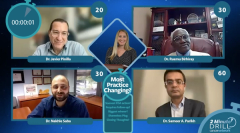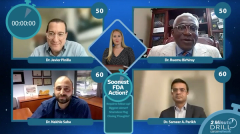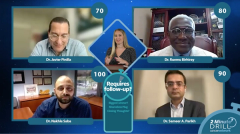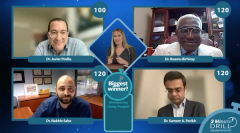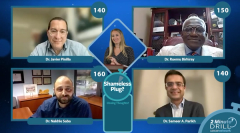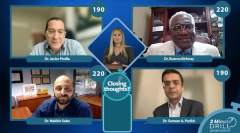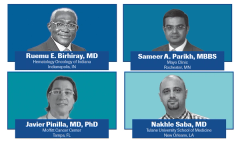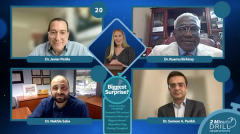
2-Minute Drill: Most Practice-Changing Trial From the 2023 ASCO Annual Meeting
Thought leaders from various institutions offered their take on the most practice-changing trial that came out of the 2023 ASCO Annual Meeting.
Episodes in this series

Following the 2023 ASCO Annual Meeting, Ruemu E. Birhiray, MD, Hematology Oncology of Indiana; Sameer A. Parikh, MBBS, Mayo Clinic; Javier Pinilla, MD, PhD, Moffitt Cancer Center; and Nakhle Saba, MD, Tulane University School of Medicine, discuss the most practice-changing data that was presented at the meeting.
The participants had 2 minutes each to give their response.
Kahl: All right, so we're going to move on. Next topic. So you each get two minutes to tell us what trial do you think will be the most practice changing that you heard out of the ASCO annual meeting? We'll go with Dr. Parikh since you just finished up?
Parikh: Sure. So I think in CLL, the trial that I really liked the most was presented by [Tanya Siddiqi, MD], and this was to do with the CAR T[-cell therapy] protocol. So in this study, patients with highly-relapsed/refractory CLL, patients who had relapsed on both a previous BTK inhibitor as well as a venetoclax [Venclexta]-based regimen were allowed to participate. And these patients all got liso-cel [lisocabtagene maraleucel (Breyanzi)], which is a CD19-directed CAR T-cell therapy. And the remarkable finding here was that the vast majority of these patients had a terrific response to treatment. And not only did they respond, I think the longevity or the duration of response was also quite remarkable. Of course, there were patients who all experienced toxicity as we've all come to know, with CAR T therapy, including cytokine release syndrome and neurotoxicity. But I think these were relatively mild and they were easily treated. In my mind, this really represents an important update of all the CAR T therapy trials that we've seen thus far in relapsed/refractory CLL and hopefully will lead to the approval of CAR T in this setting, which will be huge because our patients with double-refractory CLL–meaning those patients who have progressed on both the BTK inhibitor and venetoclax–really have no treatment options available right now.
Kahl: Absolutely. That's a great unmet need. So 40 points there. Dr. Saba?
Saba: All right, I'm going to steal Dr. Birhiray’s answer from the first one, but change it to nivolumab [Opdivo]. So the most [practice] changing for me is the SWOG S1826 study. Albeit the short duration of follow-up of 12 months only. In this landmark, very large phase 3 study with nearly 1000 participants with advanced stage classical Hodgkin lymphoma, nivolumab plus AVD challenged the new standard of care of AVD. Dr. Birhiray had mentioned–and I’m saying new standard because the BV-AVD did not become widely adopted–the overall survival benefit of BV-AVD was shown at last year's ASCO meeting with 6-year follow up data. Now back to the SWOG study, at a median follow-up of about a year, the [nivolumab] plus AVD arm was superior to the BV-AVD arm with a 12-month PFS of 94% vs 86% favoring the experimental arm. Now the BV-AVD arm does not seem to be underperforming at all, as its 1-year PFS reported in this study was nearly the same as in the prior study, ECHELON-1, in which the BV-AVD was superior to A-BVD. So the study the data was reproducible here. This is really encouraging. Although it's still very early to talk about overall survival, but that's what was observed in the N-AVD the arm: 4 [months] vs 11 [months]. And finally, the N-AVD does not seem to be associated with increased risk of toxicity overall, and manageable immune AEs and less neurotoxicity.
Kahl: Alright, we're going to go 30 points. Dr. Birhiray, your follow up?
Birhiray: All right, then I'm going to have to steal Dr. Saba’s. So going back to what Dr. Saba said earlier, and when you think of those patients in the LyMA trial, the issue was that those patients could be given rituximab [Rituxan], just like we are doing now, even though there's a survival benefit, there's still a progression-free survival effect that is maintained at 7 years. So for those patients who have mantle cell lymphoma, for whom, at least as of this point, some people do not believe that giving them maintenance rituxumab will be beneficial. I think that really cements that. Then the second part of what Dr. Saba said was the Triangle trial, [which] was the whole trial that looked at what is the role of transplant in patients who are treated with an ibrutinib [Imbruvica]-containing regimen at an intermittent basis with R-CHOP alternating with an ROC-containing regimen. And you can potentially omit autologous stem cell transplant, which has been the backbone of the treatment of mantle cell lymphoma probably for the past 10 years, maybe even the past 20 years. So the fact that that could be eliminated and patients could be treated with ibrutinib, I think these data really confirm what was seen at ASH and is truly beginning to emerge as the standard of care for the treatment of mantle cell lymphoma.
Kahl: Absolutely. We're going to go 20 points. Dr. Pinilla, close this out.
Pinilla: I have to go reverse. I am going to say, what is not going to be important in clinical trials? I agree with the rest of my colleagues, I cannot really add anything. I will agree with the LyMA [trial] and also I will agree with [the SWOG S1826 study]. So I don't think the ALLIANCE [trial) that [Dr.] Parikh [discussed] is not going to change [practice]. And I fully agree with him that it seems that adding more things in CLL is not going to really solve the problem because most our CLL patients are old and they have toxicities. We are expecting CLL17, another trial that really combined time-limited therapy vs non-time-limited therapy. But we didn't have these results in this trial. [During] ASCO, we had an update of the CAPTIVATE [trial], but again, it is not really going to change much. Although [ibrutinib plus venetoclax has] been incorporated in the NCCN [National Comprehensive Cancer Network] guidelines. But once again, it is a younger population and the registration in the study is another population that completely changed. However, we start to see differences than we see in the past where we start to see how they unmutated…drop in PFS core. So maybe it was not as good as we used to retain the beginning. The TRANSCEND [trial], I agree that is going to be the first clinical trial [of a CAR T-cell therapy] that hopefully will be approved that is going to bring very, very nice things. And that's something that I always really like to receive, these Richter transformation trials that we see [from] time to time, but everyone really looked amazing. But at the end of the day, never reapply, and those patients still have an unmet need…And again, it's always great to really see these data, you see, they start to really get patients out of the evaluation. And again, this still, to me is a very, very hard-to-treat population of patients. And we still need to really have more consistency, you know, long-term data in trials or outside of trials to really overcome these bad players.
Kahl: Just in the nick of time there, and I saw a lot of head nods on there. So I'm going to go 30 points.
Transcription edited for clarity.
Newsletter
Stay up to date on recent advances in the multidisciplinary approach to cancer.


